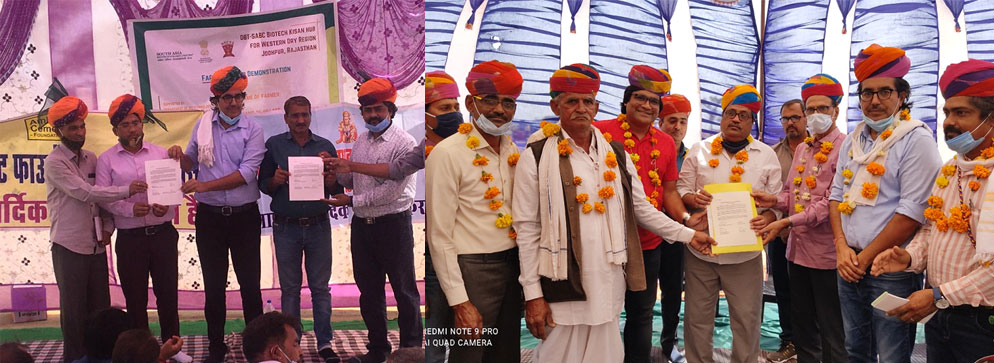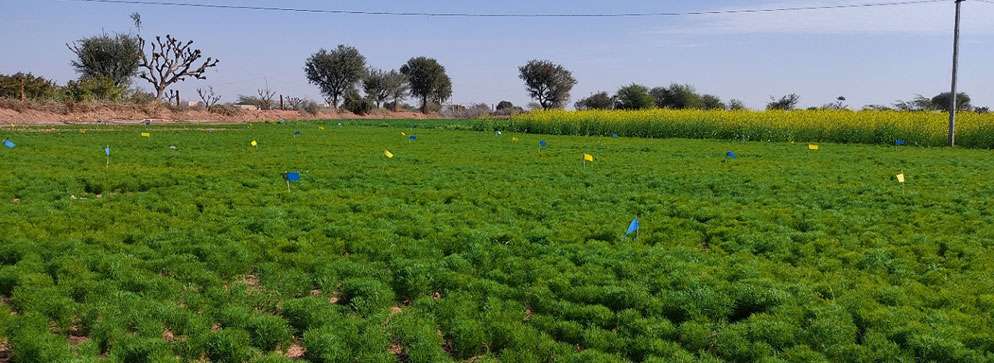
Cumin is a high-value and major seed spices crop of a western dry region of Rajasthan which comprises several pests and diseases viz, Aphid, Thrips, Fusarium wilt, and Alternaria blight. The installation of yellow and blue sticky traps for the monitoring and mass trapping of aphids and thrips can help in substantially minimizing the population of aphids and thrips. The trap can be installed in the pattern of yellow and blue alternatively. The number of traps required for the mass trapping of aphids and thrips is 25 yellow and 25 blue traps per acre. These traps are highly effective, non-toxic, easy to use and environmental friendly.
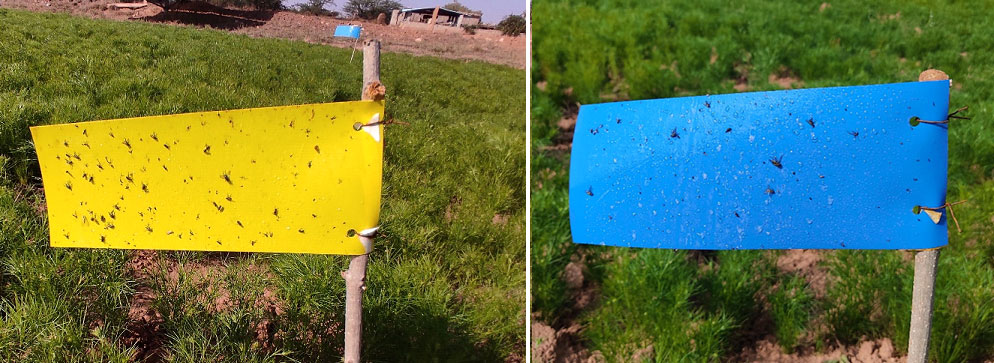
Farmers routinely apply crop protection chemicals to protect crops from pests and diseases and to avoid crop damage. The majority of pesticides neither have lable claims on seed spices nor farmers follow dose of application, which raises a serious concern about pesticide residue and can often be harmful to humans as well as the environment. In order to overcome chllanges of quality and food safety, farmers are educated to adopt the integrated pest management (IPM) based production system. The craze for production of IPM spices is growing day by day in a Western dry region of Rajasthan since the implementation of DBT’s Biotech Kisan Hub for Western Dry Region. The demand for IPM branded spices is growing internationally. Moreover, the farmers are getting a good price for IPM cumin in the market.
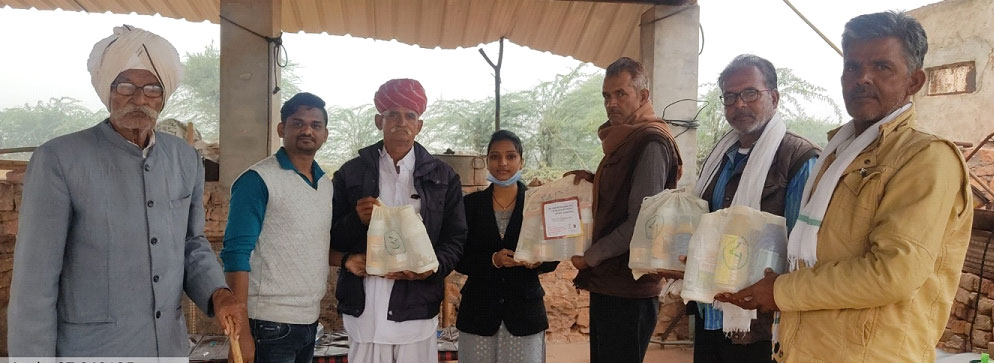
A good quality seeds of small seeded spices is critical for germination and plant growth. Under DBT Biotech Kisan hub, farmers are advised to either buy or use farm saved granded and uniform seeds for timely sowing. The seed must be treated with Trichoderma viride or Mycorrhiza @10 gm per kg seed, which helps to control soil-borne disease in seeds spices. Seed treatment is absolutely critical as it protects germinating seeds and seedlings against soil and seed-borne pathogens/insects, and improve the formation of a healthy plant.
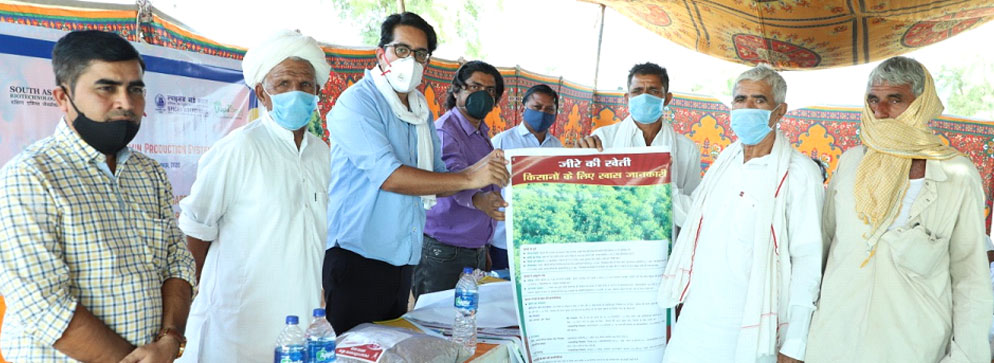
DBT Biotech Kisan hub vigorously advise farmers to follow good field preparation practices like ploughing and harrowing and apply well-decomposed FYM at 10 tonnes/ha to improve soil fertility and productivity. Farm yard manures are plant and animal wastes that are used as sources of plant nutrients, which are a good source of nutrients after their decomposition. The incorporation of Tricoderma viride with FYM help to kill soil-borne pathogen or spore present in the soil.
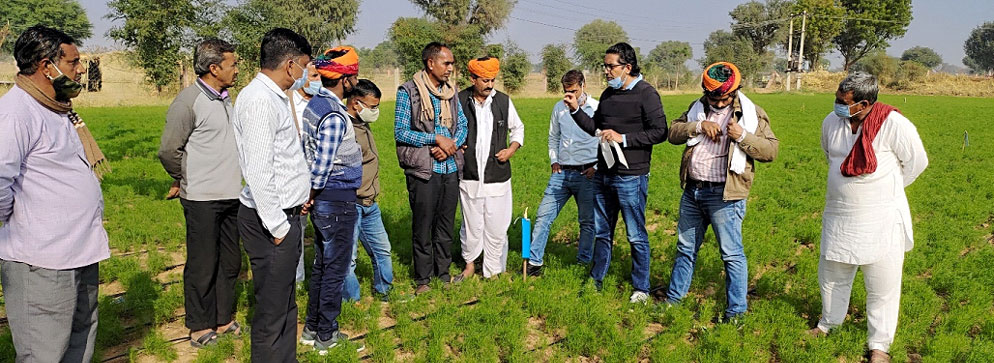
Soil testing or soil analysis is critical to know the soil health including the status of the availability of macro and micronutrients, not only to determine the actual fertilizer requirement and to manage fertilizer application but also to save soil and acquifer from accumulation of excessive chemical fertilizers. In absence of soil and water testing, it is very difficult to ensure the right application of fertilizers for the crop growth and optimum yield. DBT’s Biotech Kisan Hub has set up a state of the art and functional tinkering laboratory to test soil and water and appropriately advise farmers about integrated nutrient management (INM) practices. The tinkering laboratory supports farmers engaged in IPM field demonstrations various districts of Western Rajasthan. The soil and water samples are collected from the different demonstration farmers fields and are being processed and analyzed in the tinkering laboratory of South Asia Biotechnology Centre, Jodhpur. The soil health cards are generated based on the test results, soil health card reports are prepared and appropriate macro and micro-nutrient recommendations provided to each demonstration farmers. In addition, the tinkering laboraoty also test water used for irrigation to determine the quality of the water and to aid in the choice of fertilizers for optimum plant growth, and to minimize the risk of discharging pollutants to surface or groundwater. The water testing includes various water quality characteristics to determine its suitability for irrigation focusing on principal determinants such as salinity and sodicity and their effects on the plant-soil-water continnum.
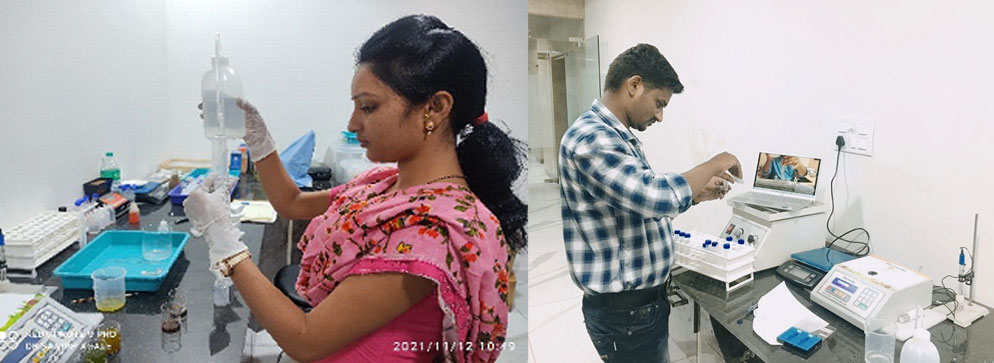
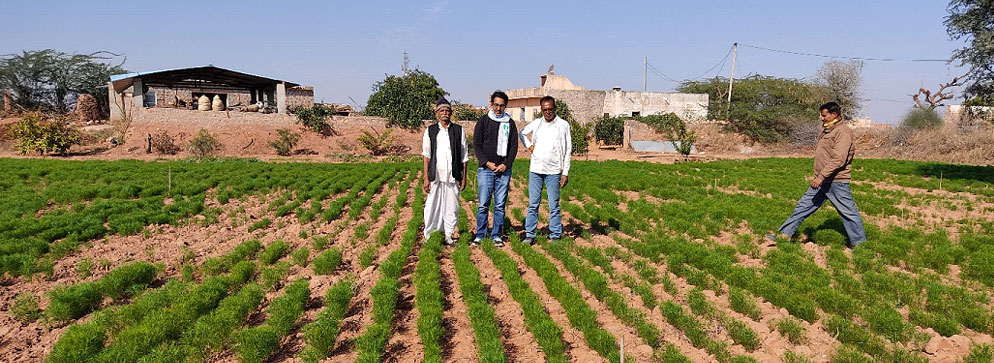
Among all seed spices, cumin occupies largest area under cultivation in Western Rajatshan. Farmers usually practice age old method of broadcasting method of sowing. Not much progress has been made to replace broadcasting with other methods of scientific cultivation. For last two years, DBT’s Biotech Kisan Hub has introduced the line sowing method as a part of a demonstration at village Budi Arjunpura, Nagaur District, Rajasthan. Using conventional multipurpose seed drill machine, the Biotech Kisan hub standardized practices of sowing seeds with seed drill while ensuring seed depth at 1-1.5cm and row-to-row distance at 25 cm.
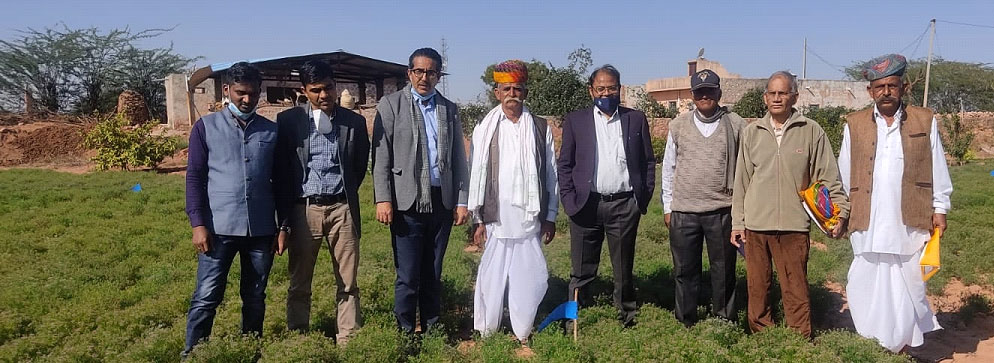
As a precaution, the seed should not be sown deeper than 1.5 cm and should be covered with a thin layer of soil. Notably, the line sowing method substantially reduces seed rate, adds in easy application of irrigation, proper weed management and fertilizer application. The line sowing method of cultivation would substantially reduce cost of cultivation and income of smallholder farmers growing seed spices in Western Rajasthan.
In the recent years, the plant growth regulators (PGRs) and biostimulants the natural or synthetic compounds that improves developmental or metabolic processes in higher plants, are used to regulate and/or accelerate the growth of plants and are important measures to ensure optimum agricultural production. Under the Biotech Kisan Hub project, farmers particulary on cumin are being advised to apply biostimulant Ambition at 500ml/acre or Pepto 600 ml/acre to help crops reach their true potential by managing nutrient efficiency, improving plant defense mechanisms, and enhancing crop performance.
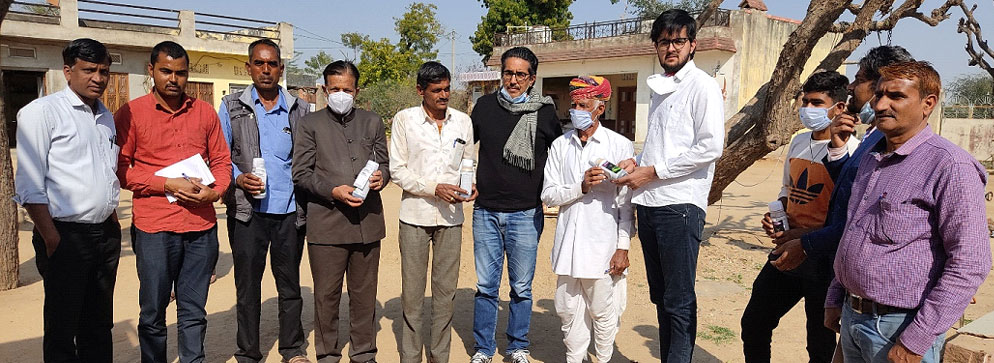
The pre-harvest interval (PHI) is the minimum amount of time between the last application of a pesticide and when the crop can be harvested. The PHI is found on the pesticide label and complying with a PHI is a legal requirement. DBT Biotech Kisan hub through field demonstration has been advising farmers to read label clain particularly on PHI to ensure proper management of pesticide residue in cumin and other seed spices.
DBT Biotech Kisan Hub has also introduced a customized digital grain moisture meter to determine moisture percent in grain to improve market realization. The customized digital grain moisture meter can determine moisture of crops growin primarily in Western Rajasthan including cumin, coriander, fennel, ajwain, fenugreek, peas, sesame and groundnut. A sample of 100 grams of grain is required to test the moisture percentage such as the moisture content at the time of cumin harvesting should be 12%, and can fetch good market proce at a mosituere of 8-10%.
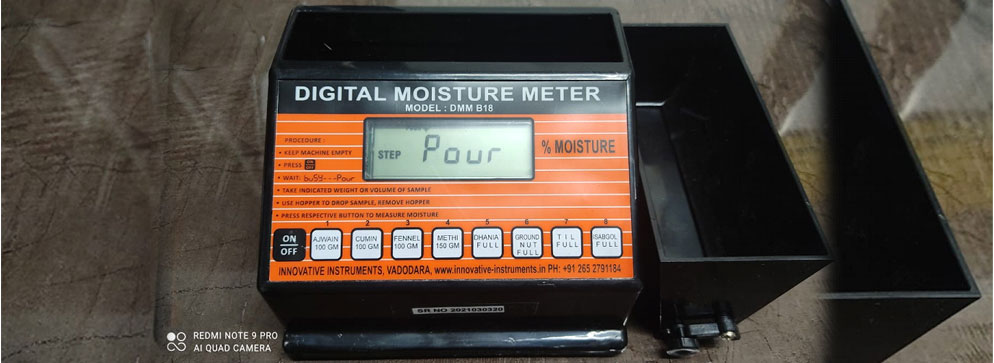
In order to achieve proper threshing, primary processing and reduce wastages, DBT Biotech Kian Hub in collaboration with the Spices Board of India has showcased and organized farm demonstration of newly introduce thereshing cum primary processor of cumin, supplied by Shri Ganesh Agricultural Works. The threshing cum primary processing machines are subsimized by the Spices Board of India to FPO/NGO/SHG to improve quality of post harvest measures. DBT Biotech Kisan hub has been demonstrating the utility of threshing cum primary processing farmers at field demonstration in the presence of officials of Department of Biotechnology, Spice Board India, hundreds of smallholder cumin farmers & representative of spices industry.
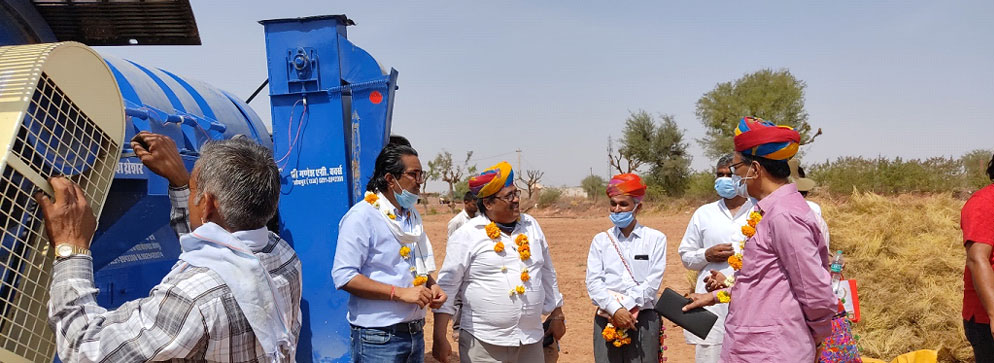
In addition, DBT Biotech Kisan hub has collaborated with the Spices Board of India to make available quality ISI certified tarpaulins to spices farmers to improve the quality, hygiene and safety of food products. Farmers usually harvest and thresh spices on clay soil laped pucca floor and such age old practices must be replaced with tarpaulin to improve quality, avoid extraneous foreign matters, vegetable matters and mammalian excreta. Under DBT Biotech Kisan Hub, farmers have been given tarpaulin and educated to use tarpaulin in order to impvoe quality and standard of harvested material.
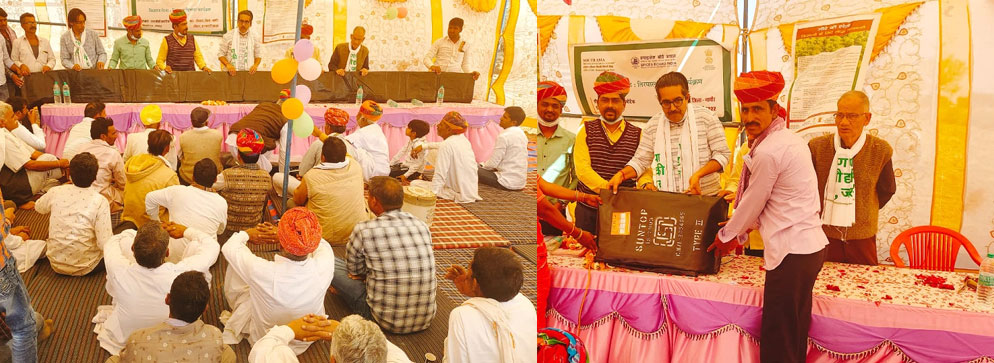
On farm training and skilling of famrers is the most ideal methods of educating farmers about package of practices, INM and IPM methods of production, quality, safety and hygiene in pre and post planting and post harvesting of small seeded seed spices. DBT Biotech Kisan hub has organized multiple farmers’ fair on the site of demonstration plots of Biotech Kisan hub projects in Jodhpur, Nagaur, Pali, Barmer, Sanchore, Ajmer and Jhunjhunu districts of Western Rajasthan. The main objective of the faremrs’ fair or kisan mela is to inform, educate and empower farmers about INM/IPM based production system, quality production and linkging farmers to buyers, processors and exporters. Thousands of farmers were trained on the plots of field demonstrations of cumin, fenugreek, Nagauri paan methi and isabgol to make farmers aware of the scientific methods of cultivation, post planting management, harvesting and post harvesting practices.
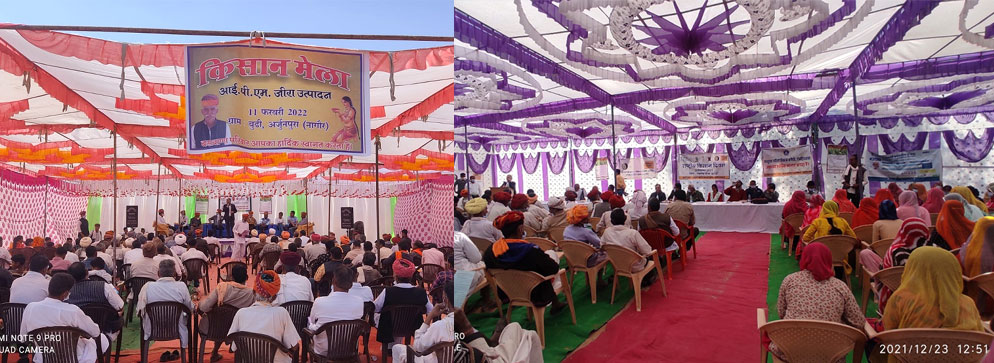
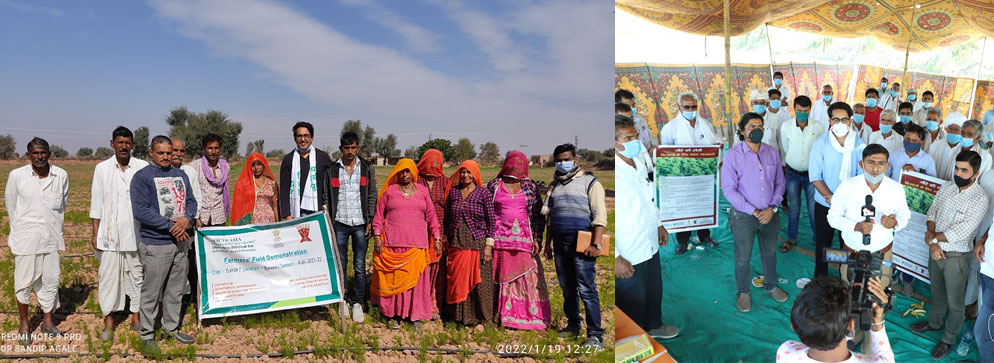
Linking farmers to industry is one of the major objective of DBT Biotech Kisan hub for Western Dry Region. In last two years, the Biotch Kisan hub has established major collaboration to procure seed spices such as cumin, isabgl and Nagauri paan methi from the farm gate. The Biotech Kisan hub has also engaged FPOs such as Green Desert FPO, Mundwa; Marwar FPO, Nagaur & Balaji FPO, Pali and processors & exporters including ITC, SRK Spices, PJM & Rapid Organics and BKB, seed spiceds association such as the Federation of Indian Spice Stakeholders (FISS) & Isabgol Processors Association, Spices Board of India, Spice Park Jodhpur, APEDA, RSAMB and Agriculure department of State of Rajastahn. Linking farmers to buyers allows us to ensure quality of farm produce by testing food safety, reducing cost of trasporation, mandi tax and better realization for farmers and value chain partners.
